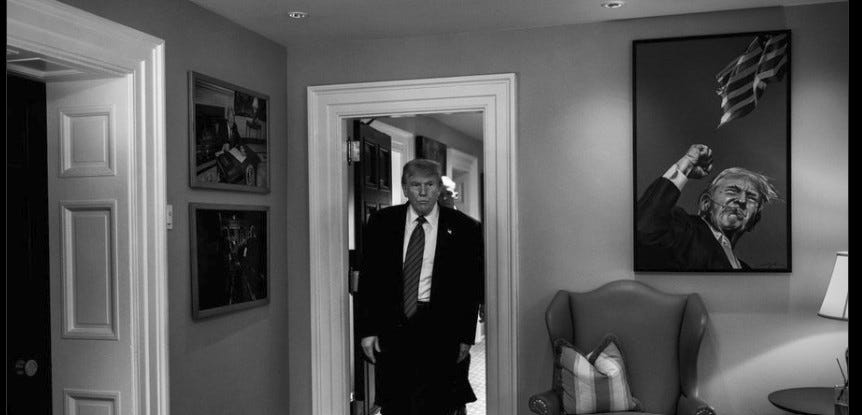
The opening paragraph of Judge Beryl A. Howell’s Memorandum Opinion on Civil Action Perkins Coie LLP v. U.S. Department of Justice, et al, is a master class in how to deploy Shakespeare properly, in a way both true to the quotations’ origins and their pertinence to the case at hand. This may seem not worthy of note, were it not for decades of politicians, judges, journalists, and pundits, taking Shakespeare’s characters’ words out of context and brandishing them as if they were edicts delivered directly from the playwright, rather than words embedded in figures with their own peculiar agendas and intentions, and values as varied as the characters in the plays themselves.
When one takes a quote from a Shakespeare play, one isn’t speaking words that express what Shakespeare himself thought or felt, but locutions and speech—acts written for a panoply of figures, wise and sinister, naïve and kindhearted, disillusioned or optimistic. The words express only the positions and thoughts of the characters and their interlocutors; yet, they are almost always dropped into opinion pieces and editorials, like literary CRISPR DNA—snips to authorize the writers’ positions by appropriating what “the Bard himself” presumably thought.
In fact, we don’t know what Shakespeare thought about most things; he was a playwright and developed complexity through the interlocution between and within characters. The best we can do is parse his morally complex characters, through whom the playwright mobilizes a great many contradictory views. One egregious example of the misuse of Shakespeare’s writing, as if it were the Bard speaking from beyond the grave, took place during the now notorious Clarence Thomas confirmation hearings, when Senator Alan Simpson, the Wyoming Republican, admonished Thomas to: “Read Othello, Judge, and never forget these lines”:
Who steals my purse steals trash, ‘tis something, nothing,
‘Twas mine, ‘tis his, and had been slave to thousands:
But he that filches from me my good name
Robs me of that which not enriches him,
And makes me poor indeed. (3.3.161-165)
Simpson apparently had forgotten that the lines are spoken by Iago—Shakespeare’s most notorious villain—as he tightened the screws on Othello, whose fears about his white wife’s fidelity were growing ever more paranoid. Literally channeling Iago to a powerful Black man (whose loyal white wife Virginia was sitting behind him at the hearing), Simpson (recently deceased) was oblivious to the mephitic irony of his misuse of Shakespeare to articulate advice tendered not by “that great Bard” but by a malevolent and racist villain intent on bringing Othello to ruin.
…this action draws from a playbook as old as Shakespeare, who penned the
Phrase: “The first we do, let’s kill all the lawyers.” WILLIAM SHAKESPEARE,
HENRY VI, PART 2, act 4, sc. 2, l. 75.
She notes the quote’s context coming from a particular speaker, which gives the quotation, misrepresented over many years, its proper background and situates Shakespeare’s views on law squarely where they belong.
“When Shakespeare’s character, a rebel leader intent on becoming king, see id. 1.74
hears this suggestion, he promptly incorporates this tactic as part of his plan to
assume power, leading in the same scene to the rebel leader demanding “[a]way
with him,” referring to an educated clerk, who “can make obligations and write
court hand,” id.1.90, 106. Eliminating lawyers as the guardians of the rule of law
removes a major impediment to the path to more power.”
Unlike Simpson, who seemed to believe he’d lent his discourse gravitas by Shakespearean invocation, Howell restored the “kill all the lawyers” line’s true meaning.
Taken out of character—the setting of rebellion/insurrection and its origin in a nefarious character—this line: “the first we do, let’s kill all the lawyers” has long been tortured into the opposite of what Shakespeare thought of the law. When people toss it around, they take it from the deep bench of anti-lawyer jokes, to which most of us chuckle ruefully, as if every representative of the bar were a bottom-feeding scum-sucking remora on civil society. Heh, lawyers. They’re mostly dirtbags, ambulance-chasers, greedy feeders on the miseries of defendants and plaintiffs.
But Shakespeare, living under the Doctrine of Divine Right during the reigns of Elizabeth I, and subsequently James I of England, knew that even “legitimate” monarchs anointed by primogeniture and theologically endowed with the “King’s Second Body,” needed the law—from the low bar of Common Law to the higher bar of legal edicts and Bills of Parliament—to reinforce and consolidate their perceived “rights” to sovereignty and power. While monarchs could claim Divine Right by birth and church doctrine, smart ones would heed the civic laws. The King may have been “the embodiment of Law,” but any sovereign who relied excessively on that statement as the rebar of their authority ruled on borrowed time. Shakespeare supported legitimate monarchy but was a savage critic of any king who took too literally the belief that he had been endowed with a special mystical body that gave him divinely endowed immunity from challenges, illegal, legal, or in the increasingly contested area between.
Shakespeare’s sovereigns often mistakenly believe they have divine right, no matter how badly or capriciously they rule. (See King Richard II, Henry Bolingbroke, or King Henry IV, the Duke Prospero of Milan, and Duke Vincentio in Measure for Measure). Such figures’ authority may be anchored in privilege of place, in this case the patriarchal primogenitary order; but if they break the laws that are the guarantors of their authority, they invite, nay, provoke rebellion and usurpation not only from the reviled Shakespearean mobs, but from well-born noblemen waiting to overthrow their way to a higher status. The line about killing all the lawyers is an acknowledgement not of attorneys’ uselessness but the opposite: As long as they are dutiful arbiters of actual law, lawyers are a stop to the machinations of sovereigns and would-be sovereigns who approve of law as long as it doesn’t get in the way of their ambitions. If you kill the lawyers, you saw off the branch you stand upon as sovereign. You undermine your authority even as you clear a path roughly through the thicket to advance your interests.
The lawyers in Shakespeare’s era get in the way. Yes, they can be enablers of tyranny—Thomas Cromwell to Henry Tudor; Walsingham to Queen Elizabeth; but the mouthpieces of law also provided necessary obstacles that aimed to stabilize social and political metrics. When the Archbishop, the Duke of York, lectures King Richard II not to seize his cousin Bolingbroke’s patrimonial estate peremptorily, York warns:
Take Hereford’s rights away, and take from time
His charters and his customary rights;
Let not tomorrow then ensue today;
Be not thyself; for how art thou a king
But by fair sequence and succession?
Now afore God—God forbid I say true!—If you do wrongfully seize Hereford’s rights,
Call in the letters patents that he hath
By his attorneys general to sue
His livery, and deny his offered homage,
You pluck a thousand dangers on your head,
You lose a thousand well-disposèd hearts,
And prick my tender patience to those thoughts
Which honor and allegiance cannot think. (King Richard II, 2:1, lns. 204-217)
After Richard arrogantly dismisses his uncle’s warning about the legal structures that underwrite his royal authority, Bolingbroke, defying his banishment, turns up on English soil with a rather large army supporting him. Defending his rebellion to his Uncle York, he asks (rhetorically), in lines that resound with the gravity of the chafing dilemma between subjects’ rights and the divine right of kings:
I am denied to sue my livery here,
And yet my letters patents give me leave.
My father’s goods are all distrained and sold,
And these, and all, are all amiss employed.
What would you have me do? I am a subject,
And I challenge law. Attorneys are denied me,
And therefore personally I lay my claim
To my inheritance of free descent. ( Ibid. 2:3, lns 133-140)
These lines succinctly frame the problem: a monarch’s authority (yoked to power), versus the need to curb power through laws that may, nonetheless, be suspended by a sovereign who decides that no checks apply to his will. It doesn’t end well for Richard; he is usurped, deposed, and murdered in prison. It doesn’t end well for Bolingbroke; his cronies prop him onto the throne but grow resentful of his exercise of an authority that he aggressively undermined. An English civil war is born, the War of the Roses (and eighty years of conflict between the Lancastrian and Yorkist branches of the royal family).
The balance of power in Shakespeare’s time tilted greatly in a legitimate King’s favor (keyword here is legitimate—inscribed in writing in legal doctrine). A sovereign may bend the law for as long as he can—in other words, for as long as his subjects go along with the bending. But at some point, Shakespeare—and English history in the early modern period proves—knows that a tipping point is always reached, at which a sovereign’s prerogatives suddenly transform into a sovereign’s reckless provocation, if not dare to be taken down. There is always someone, usually with a background in law, such as Oliver Cromwell a century later with King Charles I, who will challenge a monarch who tramples on the legal rights of those whose vested interests in legal protections rival the king’s investments in his fantasy of “absolute” power. The Divine Right of Kings is only “believed in” if not pushed into its literal reading. The “belief” is structural, operational, and functional. Even in Shakespeare’s time, most people weren’t naïve enough to think that a king had the magical powers of a sacred endowment. They chose to “believe” behaviorally in the doctrine’s machinery of legitimation, which kept society structured and organized, and when working well, kept civil strife in check.
Shakespeare understood that without laws and acceptable doctrine, there is only the power of force, and that force, without the reinforcement of conceptual authority, loses its value the moment you drive it off the proverbial lot. To be sure, if you kill all the lawyers you may be removing those who know how to use the law to check you; but it’s never a politically useful long-term strategy for any sovereign who needs to know that without the buttress of law, crude power reaches its endpoint suddenly, like Wile E. Coyote’s: at a cliff’s edge they don’t see coming, with disastrous momentum that cannot be reversed.
The post Let’s Not Kill All the Lawyers appeared first on Washington Monthly.


 1 month ago
14
1 month ago
14 










 Bengali (Bangladesh) ·
Bengali (Bangladesh) ·  English (United States) ·
English (United States) ·